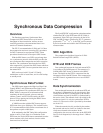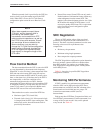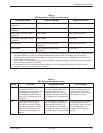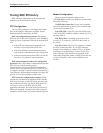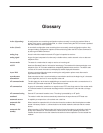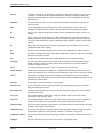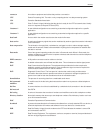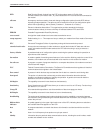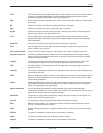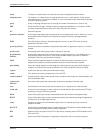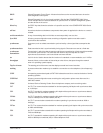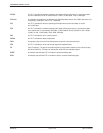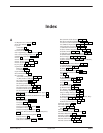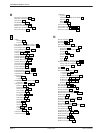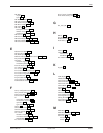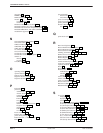
Glossary
Glossary-53980-A2-GB30-40 October 1998
The Telecommunications Standardization Sector of the International Telecommunications Union,
an advisory committee established by the United Nations to recommend communications
standards and policies. Before March 1993 it was called CCITT.
A jack used for leased-line networks. Pins 1 and 2 are the transmit pair and Pins 7 and 8 are the
receive pair.
Kilobyte or kilobytes. One kilobyte is usually taken to be 1,024 bytes.
Kilobits per second. One kilobit is usually taken to be 1,024 bits.
A set of seven keys surrounding the DCP’s LCD. These keys are used to select configuration
options and to maneuver through the DCP menu.
Liquid Crystal Display. Thin glass plates containing liquid crystal material. When voltage is
applied, the amount of light able to pass through the glass plates is altered so that messages
can be displayed.
A private line connection exclusively for the user. No dialing is necessary.
Light Emitting Diode. A light or status indicator that glows in response to the presence of a
certain condition (e.g., an alarm).
A test in which the modem’s transmit voice frequency (VF) signal is looped to its receiver.
A disconnect effected when the modem receives an extended space from a remote modem.
When a modem is commanded to disconnect, it transmits a continuous space to the opposite
modem before disconnecting.
A diagnostic procedure that sends a test message back to its origination point. Used to test
various portions of a data link in order to isolate an equipment or data line problem.
Line Signal Detect. A signal between the DTE and the device indicating energy exists on the
transmission circuit.
The structure containing the menu hierarchy starting at a Top-Level menu and extending down to
various device functions.
Microcom Networking Protocol. Levels 2-4 of this protocol, similar to ITU V.42, detect and correct
data errors caused by telephone line noise and signal distortion. Level 5, similar to ITU V.42bis,
includes data compression.
MOdulator/DEModulator. A device used to convert data from a digital signal to an analog signal
so that data can be transmitted over a telephone line. Once the data is received, the analog
signal is converted back into a digital signal.
A set of guidelines that determines how the modems connect and at what speed they
communicate. Modulations, such as V.32bis, V.32, V.22bis, V.22, Bell 212A, and Bell 103, have a
maximum and minimum data rate. See also data rate.
The process of varying some characteristics (usually amplitude, frequency, and/or phase) of a
carrier wave to form data transmissions.
A configuration of data processing devices used for information exchange.
Network Interface Module. The interface provided for the public switched telephone network
(PSTN). There are two NIMs per carrier.
Network Management System. A computer system used for monitoring and controlling network
devices.
The state of a telephone or modem that is connected to the network.
The state of a modem that is not connected to another modem.
The state of a telephone or modem that is not connected to the network.
ITU-T
JM8
kB
kbps
keypad
LCD
leased line
LED
local analog loopback
long space disconnect
loopback
LSD
menu tree
MNP
modem
modem modulation
modulation
network
NIM
NMS
off-hook
offline
on-hook



